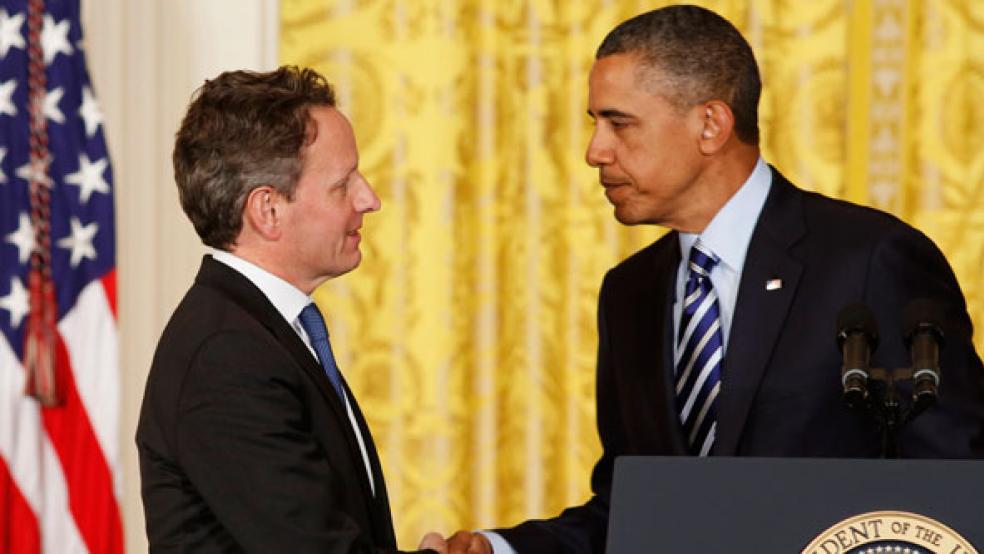Timothy Geithner leaves office today after four momentous and gut-wrenching years at the helm of the Treasury while the nation teetered on the brink of economic Armageddon.

The nation’s 75th Treasury Secretary helped President Obama navigate the nation through the worst international economic and financial crisis of modern times, including the controversial bailouts of profligate banks and the auto industry, in addition to an epic political battle with congressional Republicans over the debt ceiling that came within an eyelash of triggering the first default on U.S. debt in history.
The exacting, somewhat prickly Geithner, 51, has spent practically his entire career as a public servant within the Treasury Department and as president of the Federal Reserve Bank of New York. Contrary to rumor, he did not work for Goldman-Sachs … although his post-Treasury plans are unknown for the moment.
Some critics and government watchdogs complained that he pursued generous bailouts for Wall Street, but not for average Americans. Unemployment hovered above 8 percent for much of the first Obama administration.
Yet many economists and financial experts say Geithner helped avert another Great Depression. His leadership salvaged the financial industry and saved millions of jobs, while the Treasury assembled a new regulatory regime geared toward “systemic” risks to the economy. As evidence of his careful stewardship, the country’s GDP has grown at a faster pace than most advanced economies.
“When the history books are written, Tim Geithner is going to go down as one of our finest Secretaries of the Treasury,” Obama said earlier this month in announcing his choice of White House Chief of Staff Jack Lew to succeed Geithner.
Geithner was the last remaining member of President Obama’s original economic team and its most influential voice.
He had made it clear he wanted to step down at the end of the president’s first term and rejoin his family in New York, but in 2011 the president convinced him to remain on through the 2012 election, which he did.
According to a transcript of his farewell address to Treasury employees obtained by The Washington Post, Geithner summed up what he described as a “special code of how to think about economic policy” that he learned throughout his years at Treasury:
--Focus on what’s right, not just what is possible or easy.
--Never forget what a privilege it is to serve your country.
--Know that the world, not just America, depends on the quality of the judgments we make in this building.
--Make sure you steep yourself in what you do not know and what you cannot understand about the world.
--Don’t overdo it with excessive deference to the Secretary of the Treasury, or to the President. Tell them what you think.
--Understand we do serious work, but don’t take yourself too seriously.
--Cast your net broadly for advice, subject your initial judgments to relentless debate, but don’t let yourself be paralyzed by the difficulty of the choices, the fog, the shades of grey.
--Remember we have to be for stuff – I’m descending into self-caricature. Remember we have to be for stuff, not just against stuff – the brakes on initiative, but also the accelerator.
--No peacocks, jerks or whiners.





